Decision-Making Theories in the Context of Aviation Management
VerifiedAdded on 2023/06/08
|9
|2106
|95
Essay
AI Summary
This essay delves into the critical role of decision-making processes within business organizations, particularly in the context of aviation management. It explores two primary decision-making theories: the normative (rational) theory and the behavioral theory. The essay uses Qantas Airways as a case study, examining how both theories are applied in the company's operations. The normative theory, emphasizing efficiency and maximization, is contrasted with the behavioral theory, which accounts for individual and group behaviors. The analysis includes examples of how Qantas has made decisions based on these theories, providing insights into the complexities of organizational decision-making. The essay concludes by highlighting the importance of both theories in influencing organizational performance and competitive advantage within the aviation industry. The essay also discusses the limitations and practical applications of each theory, offering a comprehensive overview of decision-making in aviation.
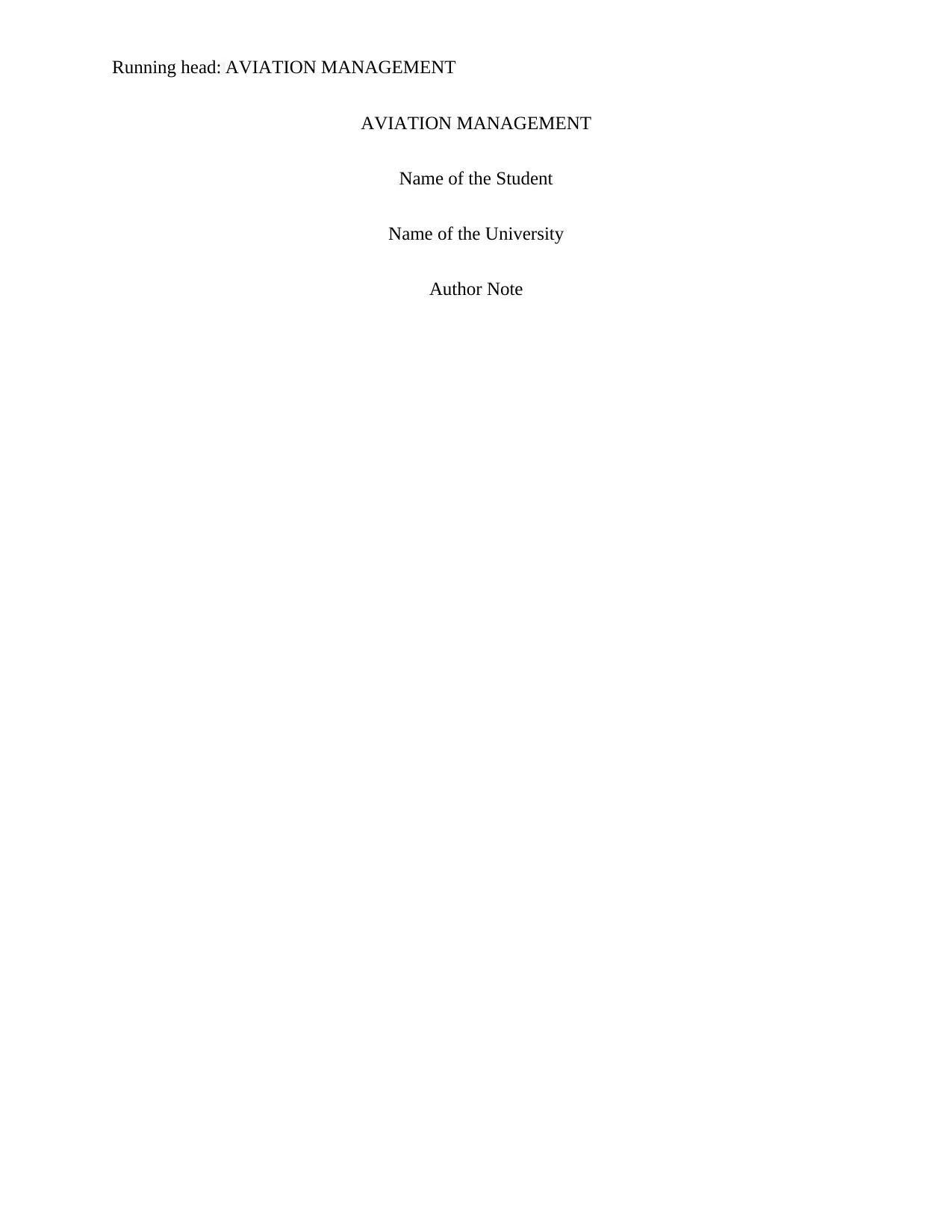
Running head: AVIATION MANAGEMENT
AVIATION MANAGEMENT
Name of the Student
Name of the University
Author Note
AVIATION MANAGEMENT
Name of the Student
Name of the University
Author Note
Paraphrase This Document
Need a fresh take? Get an instant paraphrase of this document with our AI Paraphraser
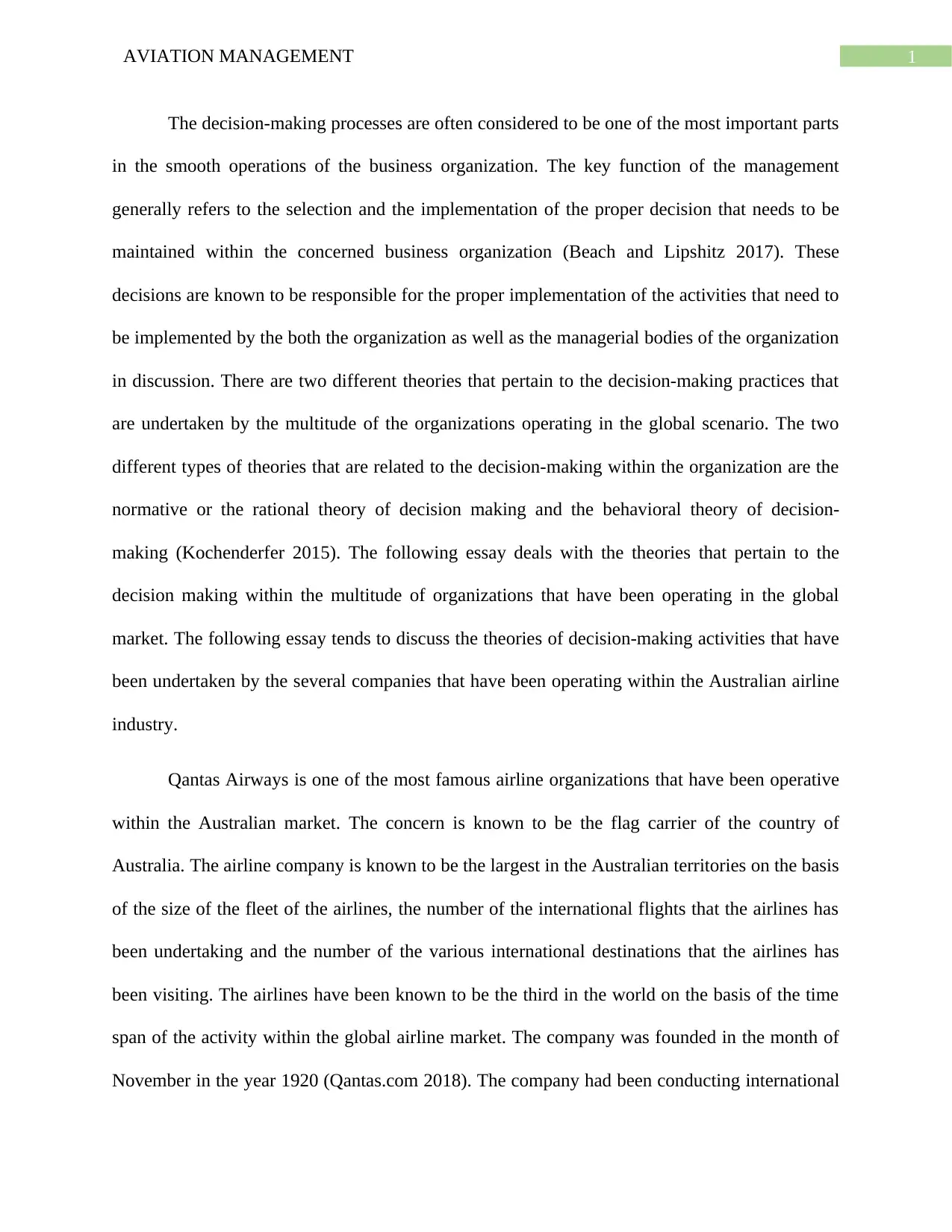
1AVIATION MANAGEMENT
The decision-making processes are often considered to be one of the most important parts
in the smooth operations of the business organization. The key function of the management
generally refers to the selection and the implementation of the proper decision that needs to be
maintained within the concerned business organization (Beach and Lipshitz 2017). These
decisions are known to be responsible for the proper implementation of the activities that need to
be implemented by the both the organization as well as the managerial bodies of the organization
in discussion. There are two different theories that pertain to the decision-making practices that
are undertaken by the multitude of the organizations operating in the global scenario. The two
different types of theories that are related to the decision-making within the organization are the
normative or the rational theory of decision making and the behavioral theory of decision-
making (Kochenderfer 2015). The following essay deals with the theories that pertain to the
decision making within the multitude of organizations that have been operating in the global
market. The following essay tends to discuss the theories of decision-making activities that have
been undertaken by the several companies that have been operating within the Australian airline
industry.
Qantas Airways is one of the most famous airline organizations that have been operative
within the Australian market. The concern is known to be the flag carrier of the country of
Australia. The airline company is known to be the largest in the Australian territories on the basis
of the size of the fleet of the airlines, the number of the international flights that the airlines has
been undertaking and the number of the various international destinations that the airlines has
been visiting. The airlines have been known to be the third in the world on the basis of the time
span of the activity within the global airline market. The company was founded in the month of
November in the year 1920 (Qantas.com 2018). The company had been conducting international
The decision-making processes are often considered to be one of the most important parts
in the smooth operations of the business organization. The key function of the management
generally refers to the selection and the implementation of the proper decision that needs to be
maintained within the concerned business organization (Beach and Lipshitz 2017). These
decisions are known to be responsible for the proper implementation of the activities that need to
be implemented by the both the organization as well as the managerial bodies of the organization
in discussion. There are two different theories that pertain to the decision-making practices that
are undertaken by the multitude of the organizations operating in the global scenario. The two
different types of theories that are related to the decision-making within the organization are the
normative or the rational theory of decision making and the behavioral theory of decision-
making (Kochenderfer 2015). The following essay deals with the theories that pertain to the
decision making within the multitude of organizations that have been operating in the global
market. The following essay tends to discuss the theories of decision-making activities that have
been undertaken by the several companies that have been operating within the Australian airline
industry.
Qantas Airways is one of the most famous airline organizations that have been operative
within the Australian market. The concern is known to be the flag carrier of the country of
Australia. The airline company is known to be the largest in the Australian territories on the basis
of the size of the fleet of the airlines, the number of the international flights that the airlines has
been undertaking and the number of the various international destinations that the airlines has
been visiting. The airlines have been known to be the third in the world on the basis of the time
span of the activity within the global airline market. The company was founded in the month of
November in the year 1920 (Qantas.com 2018). The company had been conducting international
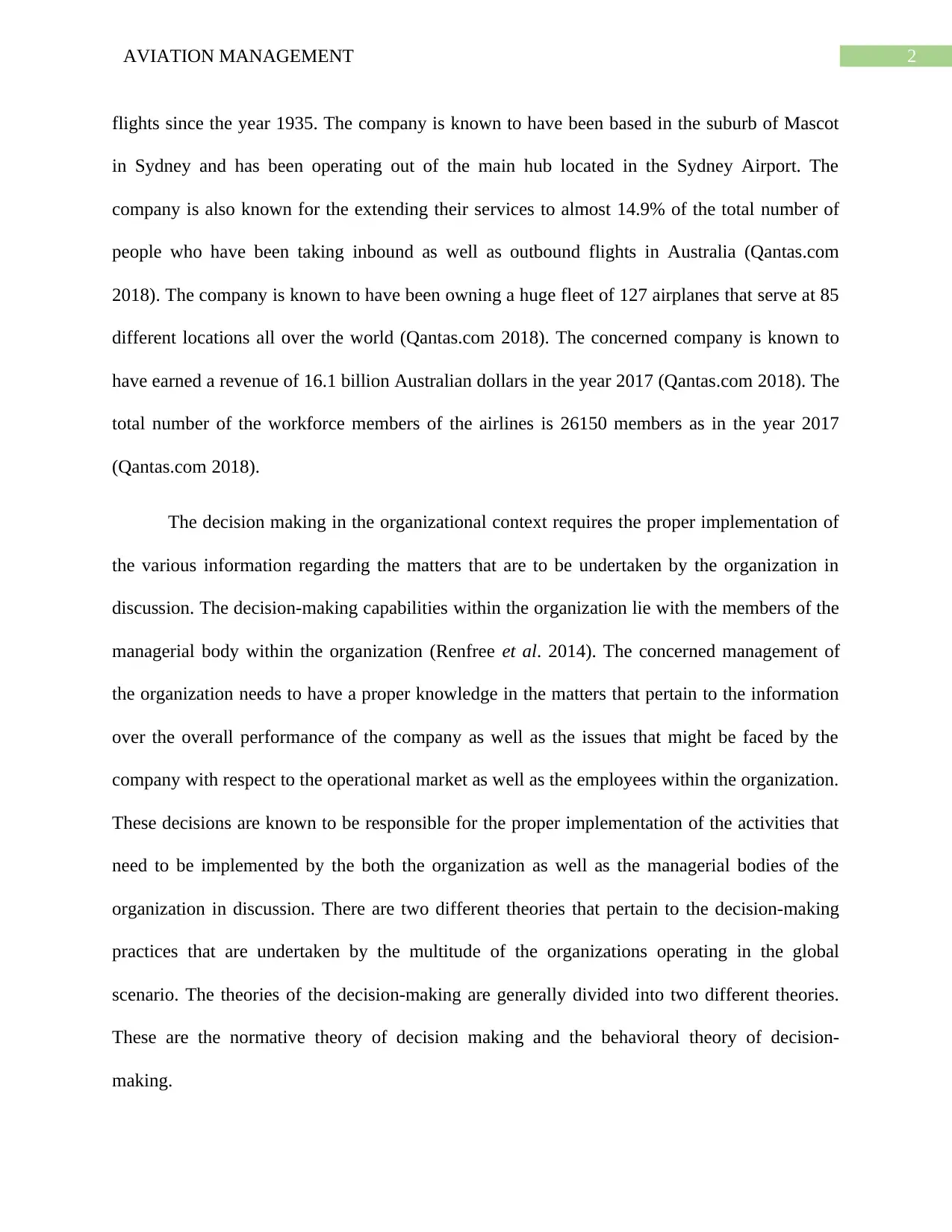
2AVIATION MANAGEMENT
flights since the year 1935. The company is known to have been based in the suburb of Mascot
in Sydney and has been operating out of the main hub located in the Sydney Airport. The
company is also known for the extending their services to almost 14.9% of the total number of
people who have been taking inbound as well as outbound flights in Australia (Qantas.com
2018). The company is known to have been owning a huge fleet of 127 airplanes that serve at 85
different locations all over the world (Qantas.com 2018). The concerned company is known to
have earned a revenue of 16.1 billion Australian dollars in the year 2017 (Qantas.com 2018). The
total number of the workforce members of the airlines is 26150 members as in the year 2017
(Qantas.com 2018).
The decision making in the organizational context requires the proper implementation of
the various information regarding the matters that are to be undertaken by the organization in
discussion. The decision-making capabilities within the organization lie with the members of the
managerial body within the organization (Renfree et al. 2014). The concerned management of
the organization needs to have a proper knowledge in the matters that pertain to the information
over the overall performance of the company as well as the issues that might be faced by the
company with respect to the operational market as well as the employees within the organization.
These decisions are known to be responsible for the proper implementation of the activities that
need to be implemented by the both the organization as well as the managerial bodies of the
organization in discussion. There are two different theories that pertain to the decision-making
practices that are undertaken by the multitude of the organizations operating in the global
scenario. The theories of the decision-making are generally divided into two different theories.
These are the normative theory of decision making and the behavioral theory of decision-
making.
flights since the year 1935. The company is known to have been based in the suburb of Mascot
in Sydney and has been operating out of the main hub located in the Sydney Airport. The
company is also known for the extending their services to almost 14.9% of the total number of
people who have been taking inbound as well as outbound flights in Australia (Qantas.com
2018). The company is known to have been owning a huge fleet of 127 airplanes that serve at 85
different locations all over the world (Qantas.com 2018). The concerned company is known to
have earned a revenue of 16.1 billion Australian dollars in the year 2017 (Qantas.com 2018). The
total number of the workforce members of the airlines is 26150 members as in the year 2017
(Qantas.com 2018).
The decision making in the organizational context requires the proper implementation of
the various information regarding the matters that are to be undertaken by the organization in
discussion. The decision-making capabilities within the organization lie with the members of the
managerial body within the organization (Renfree et al. 2014). The concerned management of
the organization needs to have a proper knowledge in the matters that pertain to the information
over the overall performance of the company as well as the issues that might be faced by the
company with respect to the operational market as well as the employees within the organization.
These decisions are known to be responsible for the proper implementation of the activities that
need to be implemented by the both the organization as well as the managerial bodies of the
organization in discussion. There are two different theories that pertain to the decision-making
practices that are undertaken by the multitude of the organizations operating in the global
scenario. The theories of the decision-making are generally divided into two different theories.
These are the normative theory of decision making and the behavioral theory of decision-
making.
⊘ This is a preview!⊘
Do you want full access?
Subscribe today to unlock all pages.

Trusted by 1+ million students worldwide
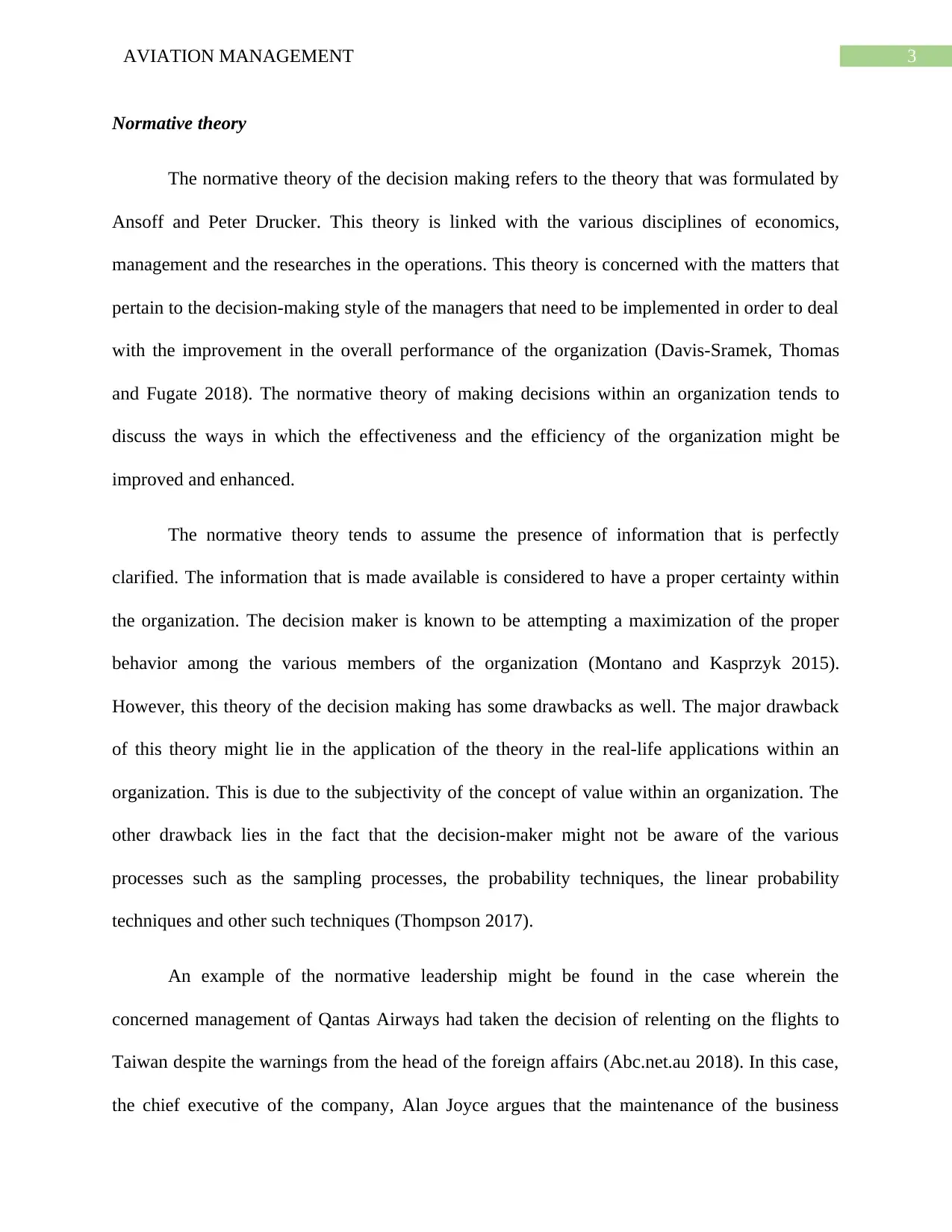
3AVIATION MANAGEMENT
Normative theory
The normative theory of the decision making refers to the theory that was formulated by
Ansoff and Peter Drucker. This theory is linked with the various disciplines of economics,
management and the researches in the operations. This theory is concerned with the matters that
pertain to the decision-making style of the managers that need to be implemented in order to deal
with the improvement in the overall performance of the organization (Davis‐Sramek, Thomas
and Fugate 2018). The normative theory of making decisions within an organization tends to
discuss the ways in which the effectiveness and the efficiency of the organization might be
improved and enhanced.
The normative theory tends to assume the presence of information that is perfectly
clarified. The information that is made available is considered to have a proper certainty within
the organization. The decision maker is known to be attempting a maximization of the proper
behavior among the various members of the organization (Montano and Kasprzyk 2015).
However, this theory of the decision making has some drawbacks as well. The major drawback
of this theory might lie in the application of the theory in the real-life applications within an
organization. This is due to the subjectivity of the concept of value within an organization. The
other drawback lies in the fact that the decision-maker might not be aware of the various
processes such as the sampling processes, the probability techniques, the linear probability
techniques and other such techniques (Thompson 2017).
An example of the normative leadership might be found in the case wherein the
concerned management of Qantas Airways had taken the decision of relenting on the flights to
Taiwan despite the warnings from the head of the foreign affairs (Abc.net.au 2018). In this case,
the chief executive of the company, Alan Joyce argues that the maintenance of the business
Normative theory
The normative theory of the decision making refers to the theory that was formulated by
Ansoff and Peter Drucker. This theory is linked with the various disciplines of economics,
management and the researches in the operations. This theory is concerned with the matters that
pertain to the decision-making style of the managers that need to be implemented in order to deal
with the improvement in the overall performance of the organization (Davis‐Sramek, Thomas
and Fugate 2018). The normative theory of making decisions within an organization tends to
discuss the ways in which the effectiveness and the efficiency of the organization might be
improved and enhanced.
The normative theory tends to assume the presence of information that is perfectly
clarified. The information that is made available is considered to have a proper certainty within
the organization. The decision maker is known to be attempting a maximization of the proper
behavior among the various members of the organization (Montano and Kasprzyk 2015).
However, this theory of the decision making has some drawbacks as well. The major drawback
of this theory might lie in the application of the theory in the real-life applications within an
organization. This is due to the subjectivity of the concept of value within an organization. The
other drawback lies in the fact that the decision-maker might not be aware of the various
processes such as the sampling processes, the probability techniques, the linear probability
techniques and other such techniques (Thompson 2017).
An example of the normative leadership might be found in the case wherein the
concerned management of Qantas Airways had taken the decision of relenting on the flights to
Taiwan despite the warnings from the head of the foreign affairs (Abc.net.au 2018). In this case,
the chief executive of the company, Alan Joyce argues that the maintenance of the business
Paraphrase This Document
Need a fresh take? Get an instant paraphrase of this document with our AI Paraphraser
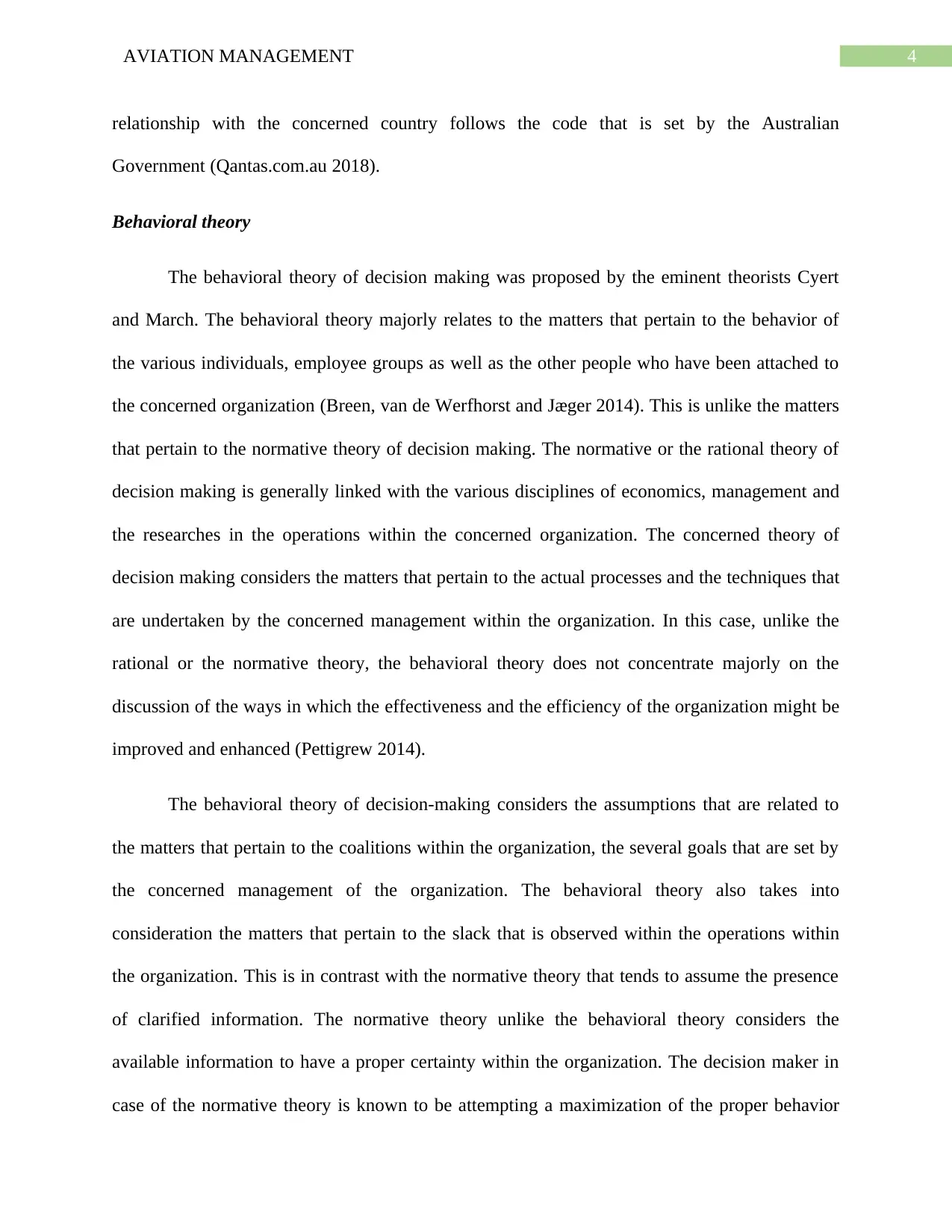
4AVIATION MANAGEMENT
relationship with the concerned country follows the code that is set by the Australian
Government (Qantas.com.au 2018).
Behavioral theory
The behavioral theory of decision making was proposed by the eminent theorists Cyert
and March. The behavioral theory majorly relates to the matters that pertain to the behavior of
the various individuals, employee groups as well as the other people who have been attached to
the concerned organization (Breen, van de Werfhorst and Jæger 2014). This is unlike the matters
that pertain to the normative theory of decision making. The normative or the rational theory of
decision making is generally linked with the various disciplines of economics, management and
the researches in the operations within the concerned organization. The concerned theory of
decision making considers the matters that pertain to the actual processes and the techniques that
are undertaken by the concerned management within the organization. In this case, unlike the
rational or the normative theory, the behavioral theory does not concentrate majorly on the
discussion of the ways in which the effectiveness and the efficiency of the organization might be
improved and enhanced (Pettigrew 2014).
The behavioral theory of decision-making considers the assumptions that are related to
the matters that pertain to the coalitions within the organization, the several goals that are set by
the concerned management of the organization. The behavioral theory also takes into
consideration the matters that pertain to the slack that is observed within the operations within
the organization. This is in contrast with the normative theory that tends to assume the presence
of clarified information. The normative theory unlike the behavioral theory considers the
available information to have a proper certainty within the organization. The decision maker in
case of the normative theory is known to be attempting a maximization of the proper behavior
relationship with the concerned country follows the code that is set by the Australian
Government (Qantas.com.au 2018).
Behavioral theory
The behavioral theory of decision making was proposed by the eminent theorists Cyert
and March. The behavioral theory majorly relates to the matters that pertain to the behavior of
the various individuals, employee groups as well as the other people who have been attached to
the concerned organization (Breen, van de Werfhorst and Jæger 2014). This is unlike the matters
that pertain to the normative theory of decision making. The normative or the rational theory of
decision making is generally linked with the various disciplines of economics, management and
the researches in the operations within the concerned organization. The concerned theory of
decision making considers the matters that pertain to the actual processes and the techniques that
are undertaken by the concerned management within the organization. In this case, unlike the
rational or the normative theory, the behavioral theory does not concentrate majorly on the
discussion of the ways in which the effectiveness and the efficiency of the organization might be
improved and enhanced (Pettigrew 2014).
The behavioral theory of decision-making considers the assumptions that are related to
the matters that pertain to the coalitions within the organization, the several goals that are set by
the concerned management of the organization. The behavioral theory also takes into
consideration the matters that pertain to the slack that is observed within the operations within
the organization. This is in contrast with the normative theory that tends to assume the presence
of clarified information. The normative theory unlike the behavioral theory considers the
available information to have a proper certainty within the organization. The decision maker in
case of the normative theory is known to be attempting a maximization of the proper behavior
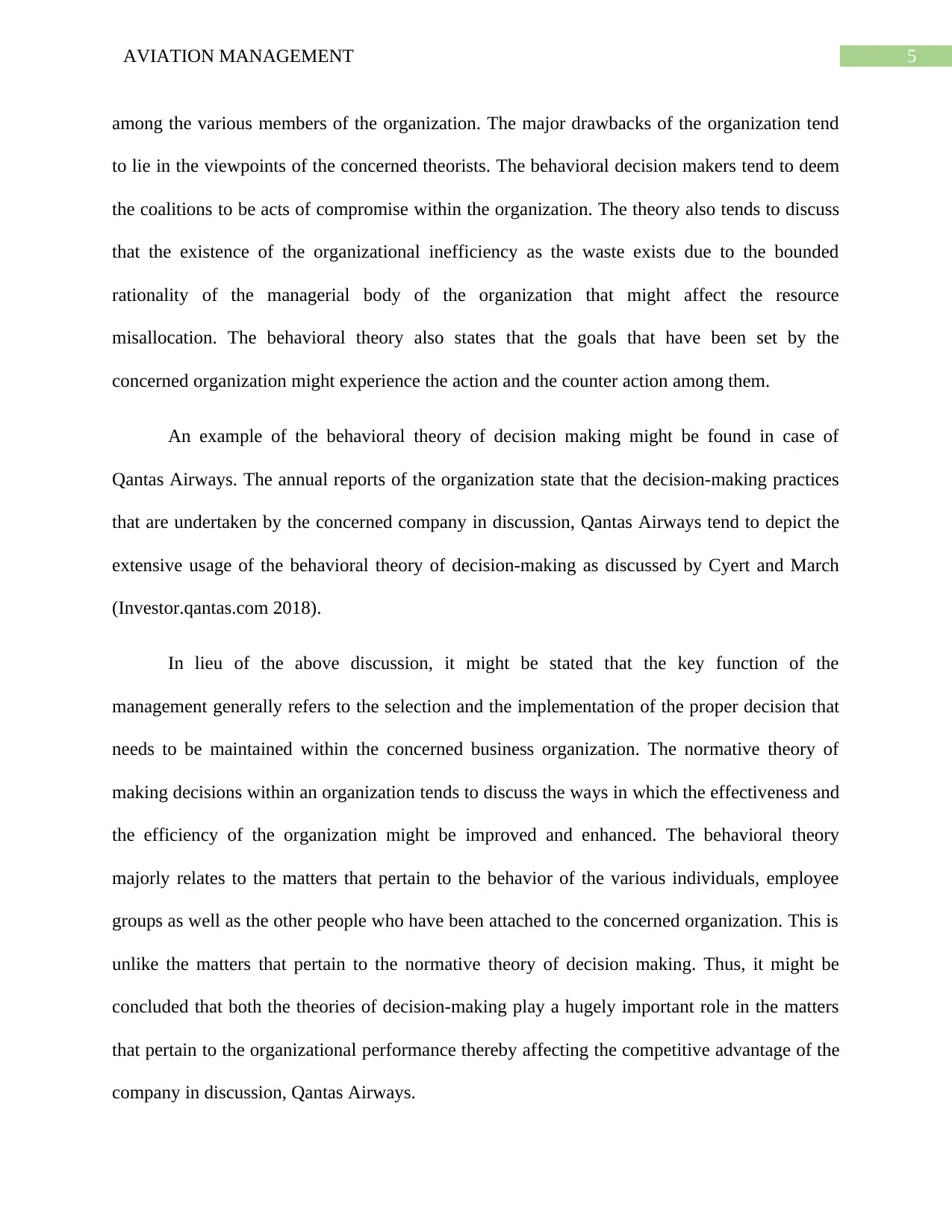
5AVIATION MANAGEMENT
among the various members of the organization. The major drawbacks of the organization tend
to lie in the viewpoints of the concerned theorists. The behavioral decision makers tend to deem
the coalitions to be acts of compromise within the organization. The theory also tends to discuss
that the existence of the organizational inefficiency as the waste exists due to the bounded
rationality of the managerial body of the organization that might affect the resource
misallocation. The behavioral theory also states that the goals that have been set by the
concerned organization might experience the action and the counter action among them.
An example of the behavioral theory of decision making might be found in case of
Qantas Airways. The annual reports of the organization state that the decision-making practices
that are undertaken by the concerned company in discussion, Qantas Airways tend to depict the
extensive usage of the behavioral theory of decision-making as discussed by Cyert and March
(Investor.qantas.com 2018).
In lieu of the above discussion, it might be stated that the key function of the
management generally refers to the selection and the implementation of the proper decision that
needs to be maintained within the concerned business organization. The normative theory of
making decisions within an organization tends to discuss the ways in which the effectiveness and
the efficiency of the organization might be improved and enhanced. The behavioral theory
majorly relates to the matters that pertain to the behavior of the various individuals, employee
groups as well as the other people who have been attached to the concerned organization. This is
unlike the matters that pertain to the normative theory of decision making. Thus, it might be
concluded that both the theories of decision-making play a hugely important role in the matters
that pertain to the organizational performance thereby affecting the competitive advantage of the
company in discussion, Qantas Airways.
among the various members of the organization. The major drawbacks of the organization tend
to lie in the viewpoints of the concerned theorists. The behavioral decision makers tend to deem
the coalitions to be acts of compromise within the organization. The theory also tends to discuss
that the existence of the organizational inefficiency as the waste exists due to the bounded
rationality of the managerial body of the organization that might affect the resource
misallocation. The behavioral theory also states that the goals that have been set by the
concerned organization might experience the action and the counter action among them.
An example of the behavioral theory of decision making might be found in case of
Qantas Airways. The annual reports of the organization state that the decision-making practices
that are undertaken by the concerned company in discussion, Qantas Airways tend to depict the
extensive usage of the behavioral theory of decision-making as discussed by Cyert and March
(Investor.qantas.com 2018).
In lieu of the above discussion, it might be stated that the key function of the
management generally refers to the selection and the implementation of the proper decision that
needs to be maintained within the concerned business organization. The normative theory of
making decisions within an organization tends to discuss the ways in which the effectiveness and
the efficiency of the organization might be improved and enhanced. The behavioral theory
majorly relates to the matters that pertain to the behavior of the various individuals, employee
groups as well as the other people who have been attached to the concerned organization. This is
unlike the matters that pertain to the normative theory of decision making. Thus, it might be
concluded that both the theories of decision-making play a hugely important role in the matters
that pertain to the organizational performance thereby affecting the competitive advantage of the
company in discussion, Qantas Airways.
⊘ This is a preview!⊘
Do you want full access?
Subscribe today to unlock all pages.

Trusted by 1+ million students worldwide

6AVIATION MANAGEMENT
Paraphrase This Document
Need a fresh take? Get an instant paraphrase of this document with our AI Paraphraser
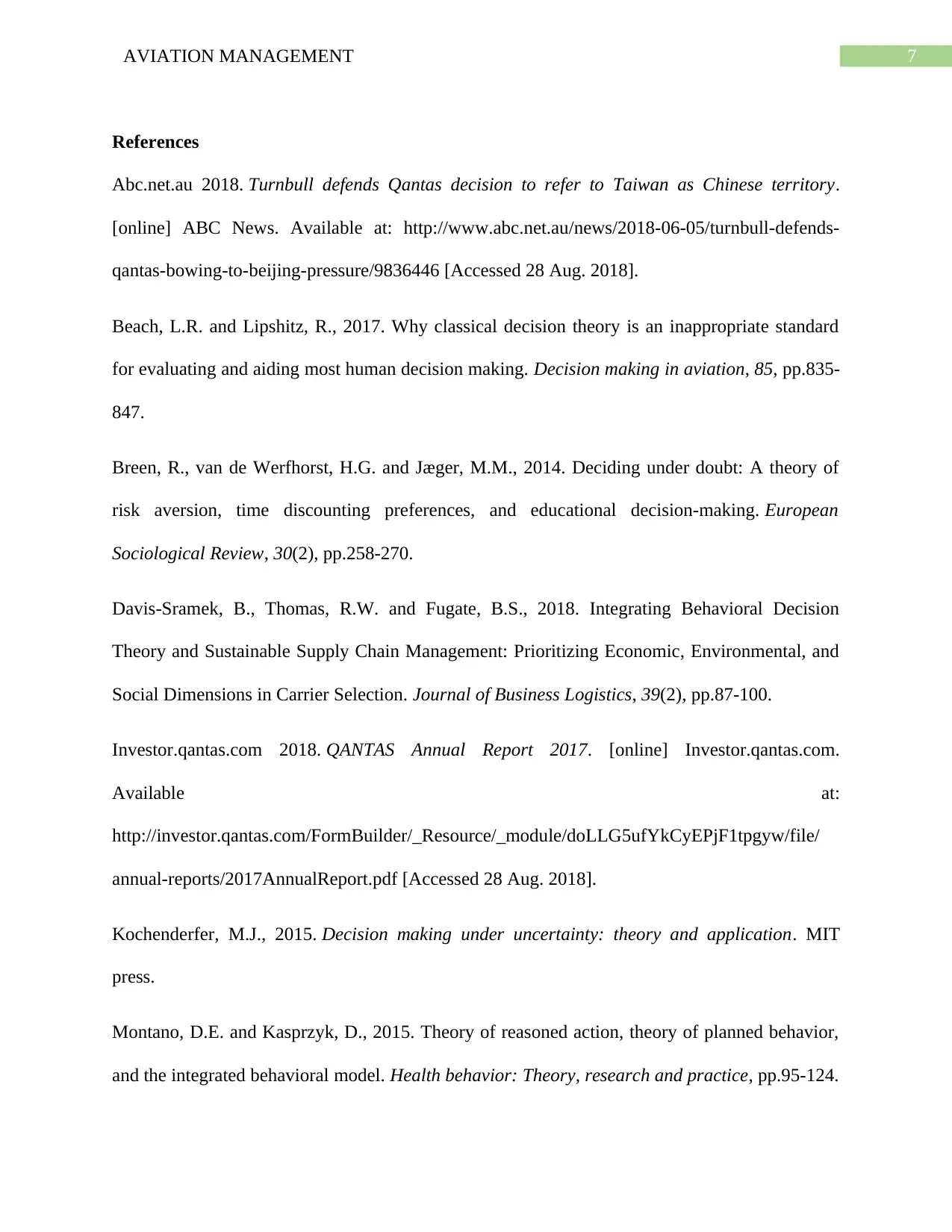
7AVIATION MANAGEMENT
References
Abc.net.au 2018. Turnbull defends Qantas decision to refer to Taiwan as Chinese territory.
[online] ABC News. Available at: http://www.abc.net.au/news/2018-06-05/turnbull-defends-
qantas-bowing-to-beijing-pressure/9836446 [Accessed 28 Aug. 2018].
Beach, L.R. and Lipshitz, R., 2017. Why classical decision theory is an inappropriate standard
for evaluating and aiding most human decision making. Decision making in aviation, 85, pp.835-
847.
Breen, R., van de Werfhorst, H.G. and Jæger, M.M., 2014. Deciding under doubt: A theory of
risk aversion, time discounting preferences, and educational decision-making. European
Sociological Review, 30(2), pp.258-270.
Davis‐Sramek, B., Thomas, R.W. and Fugate, B.S., 2018. Integrating Behavioral Decision
Theory and Sustainable Supply Chain Management: Prioritizing Economic, Environmental, and
Social Dimensions in Carrier Selection. Journal of Business Logistics, 39(2), pp.87-100.
Investor.qantas.com 2018. QANTAS Annual Report 2017. [online] Investor.qantas.com.
Available at:
http://investor.qantas.com/FormBuilder/_Resource/_module/doLLG5ufYkCyEPjF1tpgyw/file/
annual-reports/2017AnnualReport.pdf [Accessed 28 Aug. 2018].
Kochenderfer, M.J., 2015. Decision making under uncertainty: theory and application. MIT
press.
Montano, D.E. and Kasprzyk, D., 2015. Theory of reasoned action, theory of planned behavior,
and the integrated behavioral model. Health behavior: Theory, research and practice, pp.95-124.
References
Abc.net.au 2018. Turnbull defends Qantas decision to refer to Taiwan as Chinese territory.
[online] ABC News. Available at: http://www.abc.net.au/news/2018-06-05/turnbull-defends-
qantas-bowing-to-beijing-pressure/9836446 [Accessed 28 Aug. 2018].
Beach, L.R. and Lipshitz, R., 2017. Why classical decision theory is an inappropriate standard
for evaluating and aiding most human decision making. Decision making in aviation, 85, pp.835-
847.
Breen, R., van de Werfhorst, H.G. and Jæger, M.M., 2014. Deciding under doubt: A theory of
risk aversion, time discounting preferences, and educational decision-making. European
Sociological Review, 30(2), pp.258-270.
Davis‐Sramek, B., Thomas, R.W. and Fugate, B.S., 2018. Integrating Behavioral Decision
Theory and Sustainable Supply Chain Management: Prioritizing Economic, Environmental, and
Social Dimensions in Carrier Selection. Journal of Business Logistics, 39(2), pp.87-100.
Investor.qantas.com 2018. QANTAS Annual Report 2017. [online] Investor.qantas.com.
Available at:
http://investor.qantas.com/FormBuilder/_Resource/_module/doLLG5ufYkCyEPjF1tpgyw/file/
annual-reports/2017AnnualReport.pdf [Accessed 28 Aug. 2018].
Kochenderfer, M.J., 2015. Decision making under uncertainty: theory and application. MIT
press.
Montano, D.E. and Kasprzyk, D., 2015. Theory of reasoned action, theory of planned behavior,
and the integrated behavioral model. Health behavior: Theory, research and practice, pp.95-124.
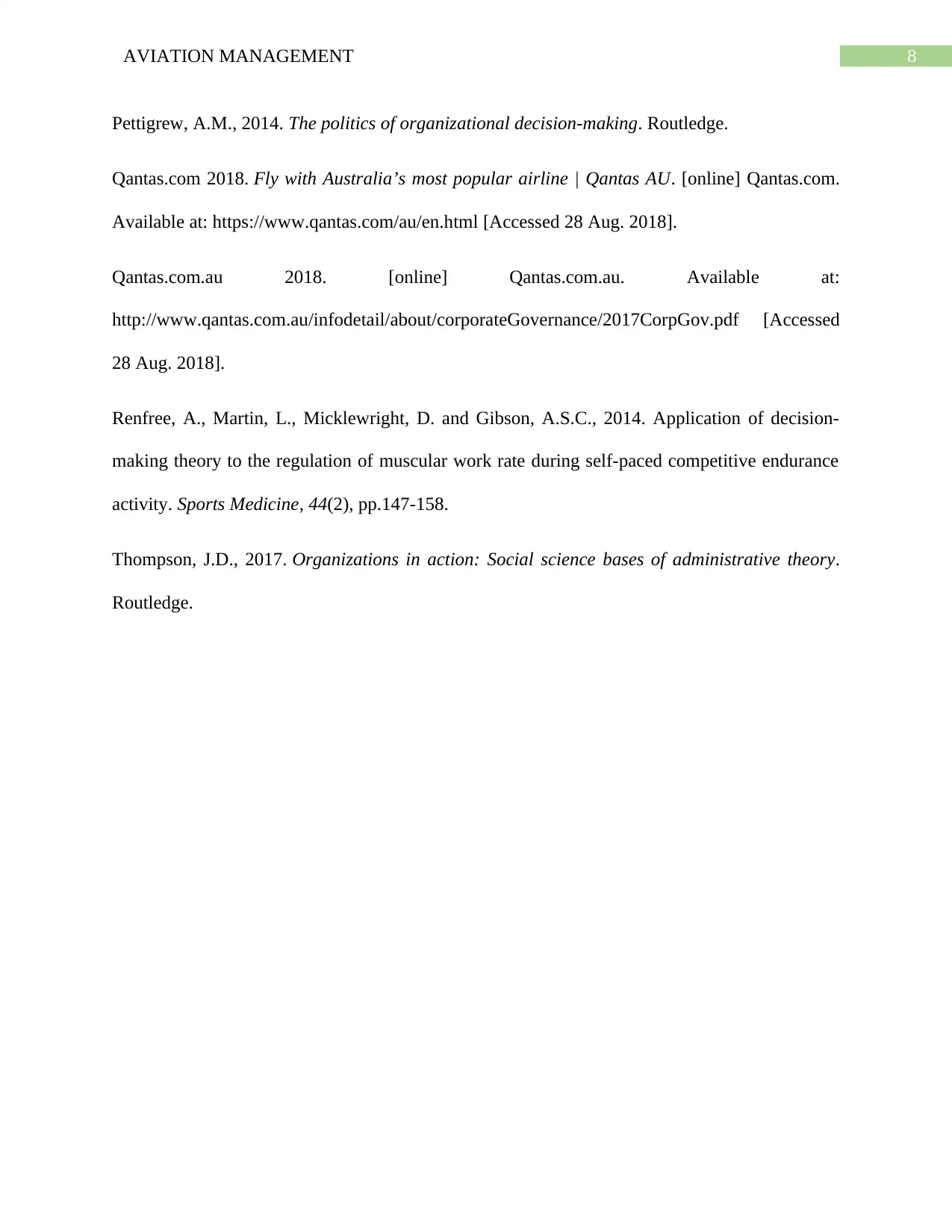
8AVIATION MANAGEMENT
Pettigrew, A.M., 2014. The politics of organizational decision-making. Routledge.
Qantas.com 2018. Fly with Australia’s most popular airline | Qantas AU. [online] Qantas.com.
Available at: https://www.qantas.com/au/en.html [Accessed 28 Aug. 2018].
Qantas.com.au 2018. [online] Qantas.com.au. Available at:
http://www.qantas.com.au/infodetail/about/corporateGovernance/2017CorpGov.pdf [Accessed
28 Aug. 2018].
Renfree, A., Martin, L., Micklewright, D. and Gibson, A.S.C., 2014. Application of decision-
making theory to the regulation of muscular work rate during self-paced competitive endurance
activity. Sports Medicine, 44(2), pp.147-158.
Thompson, J.D., 2017. Organizations in action: Social science bases of administrative theory.
Routledge.
Pettigrew, A.M., 2014. The politics of organizational decision-making. Routledge.
Qantas.com 2018. Fly with Australia’s most popular airline | Qantas AU. [online] Qantas.com.
Available at: https://www.qantas.com/au/en.html [Accessed 28 Aug. 2018].
Qantas.com.au 2018. [online] Qantas.com.au. Available at:
http://www.qantas.com.au/infodetail/about/corporateGovernance/2017CorpGov.pdf [Accessed
28 Aug. 2018].
Renfree, A., Martin, L., Micklewright, D. and Gibson, A.S.C., 2014. Application of decision-
making theory to the regulation of muscular work rate during self-paced competitive endurance
activity. Sports Medicine, 44(2), pp.147-158.
Thompson, J.D., 2017. Organizations in action: Social science bases of administrative theory.
Routledge.
⊘ This is a preview!⊘
Do you want full access?
Subscribe today to unlock all pages.

Trusted by 1+ million students worldwide
1 out of 9
Related Documents
Your All-in-One AI-Powered Toolkit for Academic Success.
+13062052269
info@desklib.com
Available 24*7 on WhatsApp / Email
![[object Object]](/_next/static/media/star-bottom.7253800d.svg)
Unlock your academic potential
Copyright © 2020–2026 A2Z Services. All Rights Reserved. Developed and managed by ZUCOL.





